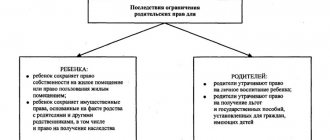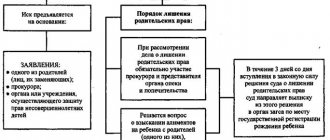- Does the state pay alimony for the debtor? Law on alimony from the state
- Creation of an alimony fund
- Conditions of receipt
- Conditions and stages of receipt
Many Russian mothers (since most often in single-parent families minor children stay with their mother) are concerned about the question: if the father does not pay child support, can the state pay for him, and where should he go for this? In this regard, State Duma deputies, government officials and representatives of the public have repeatedly spoken out about the need to create a special alimony fund , with the help of which material support would be provided to children who do not receive payments from irresponsible parents.
Unfortunately, there is still no . However, in some regions of Russia, needy low-income mothers and fathers who do not receive alimony for minor children can apply to social protection authorities for an increased monthly child benefit .
In addition, the state is expanding the list of punitive measures against debtors to encourage them to repay their debts. If the enforcement search for the debtor does not bring success for a long period of time, in 2021 the mother (father) of the child is given the right to apply to the Pension Fund of Russia (PFR) to receive financial assistance.
Photo pixabay.com
Does the state pay alimony for the debtor?
On April 3, 2021, a group of State Duma deputies from the LDPR faction proposed an amendment to the Family Code regarding state support for citizens entitled to alimony (bill No. 680786-7). Government officials are discussing the possibility of obliging the state to pay alimony to children and other needy categories of persons, starting from the 6th month of absence of payments by the person obligated for alimony.
This bill was rejected after consideration in the first reading of the State Duma. Later, other similar initiatives arose, but all of them were never adopted.
However, there is every reason to believe that alimony from the state will appear in Russia in the near future. On October 24, 2021, Vladimir Putin approved a list of instructions following an extended meeting of the Presidium of the State Council. In accordance with this document, the Government was instructed to submit proposals by August 1, 2021 to provide targeted social support to children whose parents do not pay child support. The prime minister of the Russian Federation, Mikhail Mishustin, is responsible for the implementation of this order.
The article will be updated as new information becomes available.
According to the current legislation, child support can be awarded both in shares and in a fixed sum of money (TDS):
- in a voluntary way, which involves concluding a notarial agreement;
- forcibly - through the court, if it was not possible to resolve the dispute on your own.
If the child’s mother or father leaves abroad for permanent residence, and no agreement on the payment of alimony has been reached between the parents, the interested person has the right to determine the amount of the TDS in court. The law also gives the right to provide certain property of the payer as alimony .
However, the assignment of alimony payments does not guarantee the receipt of funds into the child’s account. Vice-Rector of the Academy of Labor and Social Relations Alexander Safonov emphasizes that evasion of alimony payments is a widespread practice. Most often, fathers refuse to provide for their children and do not take part in their upbringing. According to statistics, in approximately 50 percent of cases, bailiffs cannot find debtors or collect alimony from them.
Law on payment of alimony by the state
Back in 2014, State Duma deputies O. A. Nilov, O. L. Mikheev and S. M. Mironov came up with Bill No. 489583-6, the purpose of which was to expand guarantees for children to receive alimony payments. In particular, it was said that the amount of funds collected per child should not be lower than the subsistence level in the region of residence . An exception could be difficult life situations of the alimony payer:
- disability;
- establishing the fact of serious illness;
- the need to care for a sick or incapacitated family member, etc.
In addition, deputies considered the possibility of creating a state alimony fund , from which payments would be made to needy citizens if they did not receive alimony. Unfortunately, the bill was rejected by the State Duma on July 5, 2017 and has no legal force .
There are debates in society about the advisability of making compensatory alimony payments by the state for the debtor. On the one hand, the project corresponds to state policy and will be aimed at protecting the interests of motherhood and childhood - one of the most socially vulnerable groups. However, shifting the responsibility of able-bodied family members to the state can have a number of negative consequences.
Alimony fund
The idea of creating an alimony payment fund in Russia has been discussed by government officials for a long time. It was assumed that the purpose of this structure would be to change the mechanism for paying alimony . At the moment, the claimant cannot receive funds until they are paid by the debtor.
If an alimony fund is created, then if there is a debt, funds for the child (or other disabled dependent) of the defaulter will be allocated from it. Thus, the alimony holder will no longer owe money to the collector , but to the state, which has more powerful leverage over debtors.
If the bill had been adopted, most likely, the state would have stopped compensating for child support in the same cases as when it was paid by the person obligated to pay it. These factors are regulated by Part 2 of Art. 120 of the Family Code of the Russian Federation:
- in the event of the death of one of the parties (payer or recipient of financial assistance);
- the son or daughter of the payer reaches the age of majority or the child acquires full legal capacity;
- upon the fact of adoption of a child for whom alimony was paid;
- expiration of the terms of the notarial agreement or the occurrence of circumstances that are the reason for its termination.
The adoption of a law on the creation of an alimony fund would allow women and men who do not receive alimony from their second parent for a long period of time to count on receiving compensation from the treasury. So far, no corresponding amendments have been made to the Family Code, and in 2021 there is no alimony from the state .
Benefit for a mother raising a child without a father
Some regions have provided local payments for single mothers. They are provided if a woman does not receive money. The benefit is transferred every month until the child turns 18 years old. Each entity calculates and approves the amount of compensation independently.
How to get
To assign a subsidy, you need to contact the regional social security authorities. Together with the specialist, an application is drawn up, to which the required documents are attached.
An approximate list of documents for the application:
- identification;
- birth certificate with father's name;
- the judge's decision to award alimony;
- divorce document;
- judicial act on debt collection;
- the bailiff's decision to initiate enforcement proceedings;
- information about search activities against the debtor.
Each region establishes an individual list of documents.
What does the state do if a parent does not pay child support?
Guardians with whom minor children live do not have the right to receive alimony from the state if the debtor fails to pay it. However, the authorities have developed a number of effective measures by which the Federal Bailiff Service (FSSP) influences defaulters and forces them to repay the debt .
However, if certain conditions are met, citizens can count on material compensation from the state in the event of non-receipt of alimony. In particular, the right to receive increased child benefits , taking into account the criteria of his need. This method is suitable for low-income citizens with children under age.
Conditions for receiving benefits
The amount of preferential payments, the timing and frequency of their appointment are established and regulated by each subject of the country individually (Article 16 of Federal Law No. 81-FZ of May 19, 1995). However, there are general principles according to which benefits can be increased:
- The recipient of alimony must be recognized as low-income, that is, the average monthly income for each family member must not exceed the subsistence level.
- The claimant has a writ of execution or a court decision in his hands.
- The alimony holder is hiding and (or) not fulfilling his financial obligations.
- Accumulation of unpaid debt (on average, about 6 months).
Monthly payments may also be slightly increased in cases where the child’s parent :
- is undergoing military service;
- does not pay child support for the following reasons:
- evades payment of alimony;
- undergoes compulsory treatment;
- is wanted.
serving a prison sentence;
The duration of payments is established by the authorities of the constituent entities of the Russian Federation . For example, in the Bryansk region, funds are paid until the age of 16, and if the child continues to study in a general education organization, then until the age of 18.
The amount of benefits also varies and can range from several hundred to several thousand rubles . To clarify official information about the amount and duration of payments, you must contact the social protection authorities . In some regions there may be no surcharge.
How to get benefits for non-payment of alimony
To receive “children’s” benefits, the legal representative of a child whose parent does not pay child support must contact the social security authorities at the address of residence and provide the organization’s employees with a package of the following documents:
- Application for child benefit.
- Child's birth certificate.
- A certificate confirming that the child lives together with the parent who wishes to receive the benefit.
- Certificate of salary for each family member - to confirm low income and need.
Depending on the circumstances, the following evidence is required that payment of alimony is not carried out or is impossible :
- information from the bailiff service that the location of the debtor was not established at the time of applying for increased benefits;
- a certificate of the location of the debtor: from the place of deprivation of liberty, from a medical organization, as well as a document confirming that the alimony holder does not have earnings sufficient to fulfill the court decision;
- information from the military commissariat about the conscription of the child's father for military service.
The list of required documents can be expanded: for example, sometimes a divorce certificate is required. Up-to-date information should be obtained from the social security authorities in the locality of residence.
In this case, the recipient of assistance will need to periodically confirm their low-income status so as not to lose benefits. If the relative starts paying child support again, payments from the state will also stop.
How much do they pay in 2021
Now the state compensates for expenses for children in the form of a monthly allowance. The amount of payments varies in different regions, ranging from several hundred rubles to several thousand.
Low-income families enjoy various benefits. Thus, children are reimbursed for food costs in kindergarten and school, women are provided with one-time assistance, and maternity capital funds are allocated.
In 2021, you can apply for compensation for the loss of a breadwinner if it is determined that the father does not transfer money and is taking refuge in an unknown place.
Compensation for child support from the state if the parent is wanted
If the executive search for the alimony debtor does not bring results within 1 year , the recipient of financial assistance has the right to go to court to recognize the payer as missing. If the judge makes a positive decision in the case, the child whose missing parent will be entitled to receive a survivor's pension instead of child support.
On March 7, 2021, Vladimir Putin signed Federal Law No. 48-FZ, amending Art. 278 of the Civil Procedure Code (Civil Procedure Code) of the Russian Federation. Thanks to these amendments, when considering a case on declaring a citizen missing, judges have the right to request information about the wanted alimony worker directly from the bailiff conducting the proceedings in the case.
Previously, only internal affairs bodies, which were not involved in providing information about alimony debtors, could confirm information about the impossibility of finding absent citizens. This created a hopeless situation that prevented people from receiving a pension instead of alimony.
Children whose fathers (or mothers) are missing are equated to citizens who have lost their breadwinner , according to Part 1 of Art. 10 of Federal Law No. 400-FZ of December 28, 2013. Consequently, they have the right to material support from the state in the form of an appropriate pension. It is paid until the age of 18 or 23 , if the child is studying full-time (full-time).
Thus, responsibility for the financial support of a child, one of whose parents is missing, does not fall solely on the shoulders of his mother, father or other guardian.
How to get a pension instead of alimony in 2021
After 1 year of unsuccessful search for the alimony holder, the bailiff is obliged to:
- Call the recipient of funds for an appointment.
- Explain to him the procedure for filing a claim with the district court to declare the debtor missing.
If, for some reason, the bailiff does not call the collector after a year of fruitless searches for the debtor, the recipient can independently visit the official and demand clarification from him about the procedure for declaring the alimony provider missing .
List of documents submitted to the court to recognize a citizen as missing:
- Statement of claim.
- Plaintiff's passport.
- A copy of the court order or court decision on alimony.
- A copy of the resolution on the amount of alimony debt - as confirmation of unfulfilled alimony obligations.
- A copy of the resolution on placing the debtor on the executive wanted list.
If the claims of the alimony recipient are satisfied, the court’s decision to recognize the defaulter as missing will become the main basis for assigning a pension instead of alimony . The legal representative of the child will need to contact the regional division of the Pension Fund of the Russian Federation and clarify with government agency employees the further procedure for obtaining the required pension.
Recognition of the alimony provider as missing entails serious sanctions for him. If a negligent parent is found, he will subsequently be obliged not only to repay the debt to the state represented by the Pension Fund of Russia, but also to continue to pay child support for the minor child.
Calculation of alimony within and outside of marriage
The Family Code clearly states that parents are obliged to raise and financially provide for their children, regardless of whether they are married or not. Any parent with whom the minor actually lives has the right to file a claim against the spouse in order to recover alimony.
In cases where the marriage union is dissolved or was not concluded at all, problems with the recognition of alimony payments do not arise. But you can apply for financial assistance from your current spouse only under certain circumstances:
- the parent avoids raising and providing for the child;
- spouses are engaged in separate households, which makes it difficult to verify the equality of the degree of participation of each party in the maintenance of the joint offspring;
- one of the parents distributes the family budget biasedly, thereby infringing on the rights of a minor child.
Important! Being in a civil marriage, the mother can count on financial assistance only if the paternity of a particular citizen is officially proven.
Debtor's liability for non-payment of alimony
Family, executive and administrative legislation defines a wide range of effective measures to influence debtors. The application of penalties should encourage alimony payers to repay the debt. The methods used by bailiffs include:
- Fine:
- Articles 17.14 and 35.1 of the Code of Administrative Offenses (CAO) of the Russian Federation provide for fines from 1,000 to 20,000 rubles;
- according to Part 2 of Art. 115 of the RF IC, the recipient of alimony payments has the right to recover from the debtor a penalty in the amount of 0.1% of the debt amount for each day of delay.
- If you have a debt of 10,000 rubles. It is possible to suspend a special right – the debtor’s driver’s license .
- Ban on travel outside the Russian Federation.
- Seizure of funds and property of the defaulter, and also provides for the possibility of foreclosure on the property of the defaulter. This means that the debtor’s property and money located in banks can be withheld and allocated to pay alimony debt .
- Putting the defaulter on the wanted list.
- Deprivation of alimony parental rights.
- Involvement in compulsory work for up to 150 hours.
- Administrative arrest – from 10 to 15 days.
- If there is a deliberate malicious failure to pay alimony, alimony may be applied to a citizen criminal liability measures:
- correctional or forced labor;
- arrest up to 3 months;
- imprisonment for up to 1 year.
Criminal liability (maximum sanction) occurs if administrative methods have already been applied to the alimony defaulter, and they did not bring results .
In accordance with the law, sanctions will be applied to the alimony provider only if the debt arose through his fault. Otherwise, the citizen may be exempt from paying the debt .
Social pension for abandoned children
In 2021, abandoned children began to receive subsidies. This category includes minors left in a hospital or with third parties. However, the identities of the mother and father have not been established.
How to get
The following persons can submit documents:
- foster parent or guardian;
- guardianship and trusteeship authority;
- organization for orphans;
- children from 14 years old.
The papers are sent to the pension fund. Along with the application, a birth document is provided without information about mom and dad. If the foundling is adopted, the guarantee of compensation ends.
The amount of financial assistance is 10,068 rubles. In some regions, the amount increases due to the use of regional coefficients and can reach 14,000 rubles.
When payments stop
Since the subsidy from the state is equivalent to alimony payments, it is terminated on the same grounds.
A child stops receiving money if:
- reaching adulthood;
- emancipation in full;
- adoption;
- marriage before 18 years of age;
- dad's return from the army;
- release from prison;
- search for the debtor;
- death of the payer, etc.










